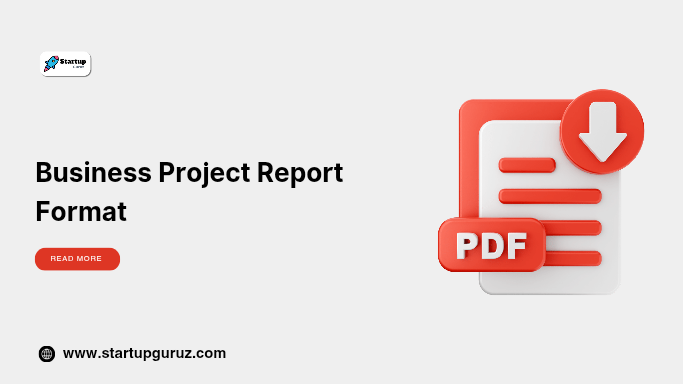Business Project Report Format
Business Project Report Format: A Complete Guide
Creating a business project report is an essential step for any entrepreneur or organization planning to start or expand a business. A well-structured report outlines the project’s feasibility, financial requirements, potential challenges, and expected outcomes. It serves as a roadmap for stakeholders, including investors and financial institutions, to understand the business’s objectives and strategies. This guide provides a detailed overview of the business project report format, its components, preparation tips, and answers to frequently asked questions.

What is a Business Project Report?
A business project report is a comprehensive document that details all aspects of a project, from planning to execution. It includes market analysis, financial projections, operational strategies, and risk assessments. The primary goal is to present a clear picture of the project’s viability and profitability.
Importance of a Business Project Report
- Decision-Making Tool: Helps entrepreneurs and stakeholders evaluate the feasibility and potential success of the project.
- Securing Funding: Essential for attracting investors and securing loans from banks.
- Operational Guide: Provides a structured plan for implementing and managing the project.
- Monitoring and Evaluation: Acts as a benchmark for tracking the project’s progress and identifying areas for improvement.
Key Components of a Business Project Report Format
1. Cover Page
The cover page includes:
- Project title
- Business name
- Contact details
- Date of preparation
2. Executive Summary
A concise overview of the project, including:
- Objectives
- Key highlights
- Financial requirements
- Expected returns
Example:
| Objective | Launch a cloud-based software solution for small businesses. |
|---|---|
| Funding Needed | ₹50,00,000 |
| ROI Expected | 30% within the first year |
3. Business Description
Detail the business idea, products/services offered, and the value proposition.
Example:
- Business Idea: Developing eco-friendly packaging materials.
- Products: Biodegradable bags, reusable containers, and compostable wrappers.
- Value Proposition: Sustainable alternatives to traditional packaging.
4. Market Analysis
Provide a detailed analysis of the market, including:
- Target Market: Define the audience based on demographics and preferences.
- Market Trends: Highlight growth opportunities and industry developments.
- Competitive Analysis: Identify competitors and analyze their strengths and weaknesses.
5. Organization Structure
Define the roles and responsibilities of key team members.
Example:
| Role | Responsibility |
|---|---|
| CEO | Overall business strategy and execution |
| Operations Manager | Oversee daily operations |
| Marketing Manager | Develop and implement marketing plans |
6. Financial Plan
This section includes:
- Startup Costs: Initial investment required for equipment, licenses, and setup.
- Operational Costs: Salaries, utilities, raw materials, etc.
- Revenue Projections: Income estimates for the next 3–5 years.
Example:
| Expense Type | Amount (₹) |
|---|---|
| Equipment | 10,00,000 |
| Marketing | 3,00,000 |
| Salaries | 5,00,000 |
7. Marketing Plan
Outline strategies to promote the business, including:
- Digital Marketing: SEO, social media ads, and email campaigns.
- Offline Marketing: Trade shows, print media, and community events.
- Customer Retention: Loyalty programs, discounts, and excellent customer service.
8. Risk Analysis
Identify potential risks and propose mitigation strategies.
Example:
| Risk | Likelihood | Impact | Mitigation Strategy |
|---|---|---|---|
| Supplier Delays | High | Moderate | Maintain backup suppliers |
| Market Competition | Medium | High | Focus on niche segments |
9. Project Timeline
Present a timeline for key milestones, such as:
- Product development
- Market launch
- Revenue generation
10. Conclusion
Summarize the project’s potential and reiterate the key benefits for stakeholders.
Steps to Prepare a Business Project Report
- Understand the Purpose: Determine whether the report is for internal planning, funding, or partnership proposals.
- Conduct Research: Gather data on the market, competition, and industry trends.
- Use a Template: Utilize pre-designed templates for consistency and structure.
- Focus on Clarity: Ensure that the report is easy to read and understand.
- Incorporate Visuals: Use graphs, charts, and tables to present data effectively.
Tips for an Effective Business Project Report
- Be Objective: Base your analysis on facts and data.
- Keep it Professional: Use formal language and avoid jargon.
- Highlight Key Points: Use headings and bullet points for better readability.
- Review Thoroughly: Check for errors and ensure that all information is accurate.
FAQs About Business Project Report Format
1. What is a business project report format?
It is a structured template used to prepare a detailed project report for business planning or funding purposes.
2. Why is a project report important?
A project report helps in evaluating feasibility, securing funding, and guiding project execution.
3. What are the key sections of a project report?
Executive summary, business description, market analysis, financial plan, and risk assessment are essential sections.
4. How do I make my project report visually appealing?
Use charts, graphs, and tables to present data clearly and concisely.
5. Can I prepare a project report using Excel?
Yes, Excel is commonly used for financial calculations and data visualization in project reports.
6. What is the role of risk analysis in a project report?
Risk analysis identifies potential challenges and outlines strategies to mitigate them.
7. Who prepares the business project report?
Typically, entrepreneurs, consultants, or project managers prepare the report.
8. How often should a project report be updated?
Update the report whenever there are significant changes in project scope or market conditions.
9. Is it necessary to include financial projections?
Yes, financial projections provide insights into the project’s profitability and sustainability.
10. Can a project report help in securing bank loans?
Yes, a well-prepared project report is often required to apply for loans and funding.